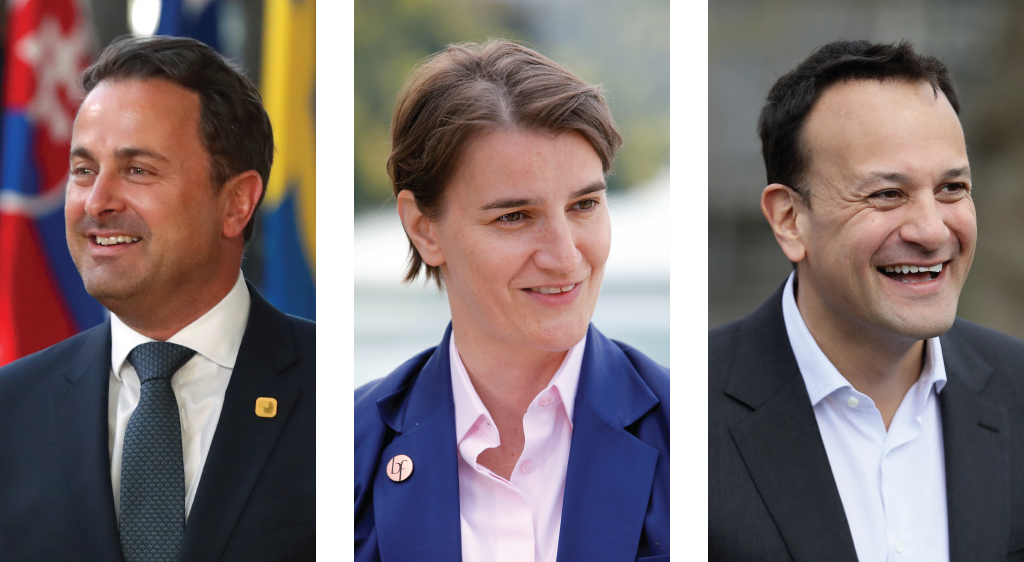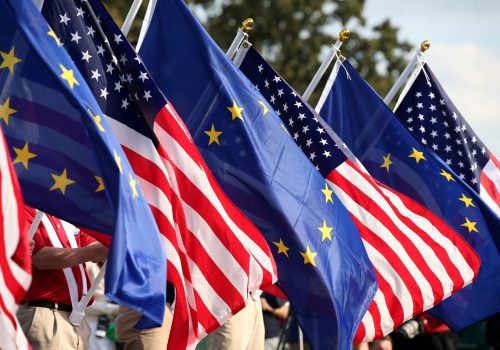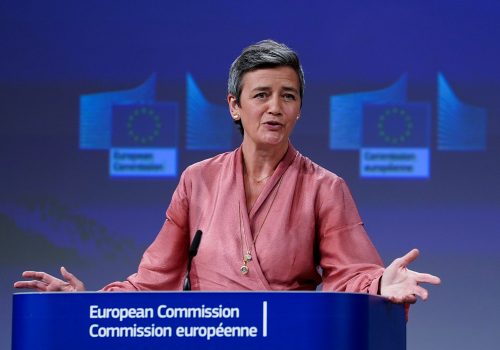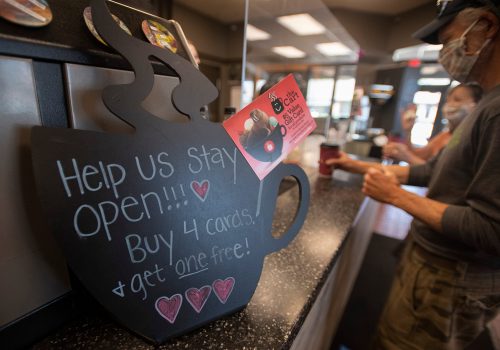As the world marks Pride Month, three prominent out LGBTI European leaders discussed their countries’ fight against coronavirus, ongoing disagreements between Europe and the United States, and the continuing fight for LGBTI equality.
In a June 30 virtual event hosted by the Atlantic Council to mark Pride Month, Xavier Bettel, prime minister of Luxembourg since 2013, called on European leaders to cooperate more on their coronavirus response, especially on the development of a vaccine, which could turn into a “nightmare” if countries compete for supplies. Ana Brnabić, the prime minister of Serbia, described her struggles with coming out in a conservative society, but said that “if I could have at least one gay person in Serbia feel more at ease with themselves, then my goal will have been achieved.” Leo Varadkar, former Taoiseach (prime minister) and now Tánaiste (deputy prime minister) of Ireland noted that the modern struggle for LGBTI rights largely began at Stonewall in New York, but lamented that on these issues “we don’t really have American leadership anymore.”
Here’s a closer look at what they discussed:
FIGHTING CORONAVIRUS:
- The data so far: The three countries have performed relatively well with regard to COVID-19. So far, Ireland has confirmed 25,462 cases and 1,735 deaths; while Serbia had 14,564 cases and 277 deaths, and Luxembourg, 4,299 cases and 110 deaths.
- Echoes of the migration crisis: Brnabić said that COVID-19 reminded her of the migration crisis in 2014, when each EU member state approached the situation individually. “And now with COVID-19, we saw basically the exact same thing happening all over again,” she said. “We should have a common European response to these types of global challenges, regardless whether a country is an EU member or not.”
- Solidarity needed: Varadkar, praising the EU’s May 27 announcement of a €750 billion recovery program to rescue the bloc from its current crisis, said Italy and Spain suffered the brunt of the pandemic—and that the EU’s other members must share the burden. “We should be able to support countries that have been hit more than others,” he said. But at the same time, “we have to be clear that this money is used as an answer to COVID-19. It can’t be used for other stuff. And finally, we should be able to see that the rules are respected or not. It’s a terrible crisis, so we need strong answers.”
- Economic pain remains: The situation remains dire in Ireland, said Varadkar, who is slated to return as Taoiseach in 2022 as part of an agreement with the government that took power last week. On June 29, all Irish restaurants and cafes reopened, though pubs, nightclubs, and casinos remain shuttered. Unemployment stands at around 20 percent, he said. “It’s a very serious economic crisis, and very unequal. It’s the private sector workers who have lost their jobs—mainly younger people and migrants—whereas people working for big multinationals and the state have been largely unaffected. The economic crisis that’s coming could be very divisive,” Varadkar said, warning of “a second wave which could set us back once more.”
- Digital solutions: Brnabić said her government’s insistence on “going digital in Serbia” before the pandemic began helped her country enormously during its recent lockdown. “Thanks to e-government, we continued providing services,” she said. “Enrollments are currently completely electronic, and our kids did not lose even one single day of school.”
- “Nightmare” race for vaccine: Bettel feared that the competition between countries over protective equipment seen at the beginning of the crisis could also repeat itself if countries do not cooperate on vaccine development and distribution. “The race for the vaccine will be a nightmare if we are not able to collaborate,” he said, noting that many international policymakers “often speak global, but we act local.”
- Safeguards remain, but no return to lockdowns: Brnabić said that “what keeps me awake at night now is that COVID is not going to pass. We will have to learn how to live with this virus at least until a vaccine is found.” Yet she said that Serbia—which aspires to EU membership—“will not be able to go back to a full lockdown. The economy would not survive.”
Watch the full event:
COMING OUT:
- A day when no one will care about “out or not”: Luxembourg’s Bettel, who has been prime minister since 2013, said it’s useless to hide one’s feelings—especially for a gay man with political aspirations. “When I did my coming out a few years ago, the hardest part was to accept myself and tell my mom. I never hid it,” he told moderator Damon Wilson, executive vice-president of the Atlantic Council. “You invited here three ‘out’ politicians. I hope that one day, nobody will care about being out or not. The fact there’s only been five of us who have led governments is sad, because there must have been many more who just didn’t come out, or couldn’t come out.”
- Societal transformation: Varadkar noted that Ireland, a predominantly Roman Catholic nation, had been changing long before he became prime minister. “I’m just a product of a society that has become more modern, more liberal, and less religious,” he said, adding that his sexual orientation was no secret in Dublin, but that he confirmed it in a radio interview during the runup to Ireland’s referendum on marriage equality. “I knew I’d be campaigning for a ‘yes.’ I couldn’t pretend to be disinterested or neutral,” he said. “That was the trigger for me.”
- Difficult times and criticism: In Serbia—still a country dominated by the Orthodox Church—the situation was “very different,” said Brnabić. “I had to go through some really difficult times. It was terrible for my family, and especially for my partner, but we got over it,’ she said, noting that she’s been heavily criticized by Serbia’s LGBT community for not doing enough—a sentiment with which she strongly disagrees. “I do attend every Pride parade in Belgrade, and I talk to people who criticize me.”
- The motivation to serve: Brnabić is not only one of the world’s few lesbian politicians: she also had a son born during her term of office; he’s now sixteen months old. “My mission was firstly to be a gay prime minister. My job wasn’t to push the LGBT agenda, but to be prime minister and assure that everyone lives better,” she said, suggesting that “if I could have at least one gay person in Serbia feel more at ease with themselves, then my goal will have been achieved.”
TRANSATLANTIC TIES:
- Avoiding getting caught in the middle: On the subject of US-China relations, the leaders steered clear of choosing a side. “Serbia is far too small to be in between these giants,” Brnabić argued. “We don’t want to be the grass on which the elephants are fighting. We want to mind our own business.”
- Looking for US leadership: Mike Guest, co-founder of the Council for Global Equity and the first publicly gay man to serve as a US ambassador, asked how Europeans view the US role under President Donald Trump. “There’s a sadness in Ireland that we don’t really have American leadership anymore because for most of the last century if not longer, the US has been a force for good in the world,” Varadkar replied. “The battle for LBGT equality began in New York, at Stonewall. There was a time when America was ahead of the world on so many issues such as this, and it’s not that country anymore. Perhaps that will change in November.”
Larry Luxner is a Tel Aviv-based freelance journalist and photographer who covers the Middle East, Eurasia, Africa and Latin America. Follow him on Twitter @LLuxner.
Further reading:
Image: (From right) Prime Minister Xavier Bettel of Luxembourg, Prime Minister Ana Brnabić of Serbia, and Tánaiste Leo Varadkar of Ireland.



